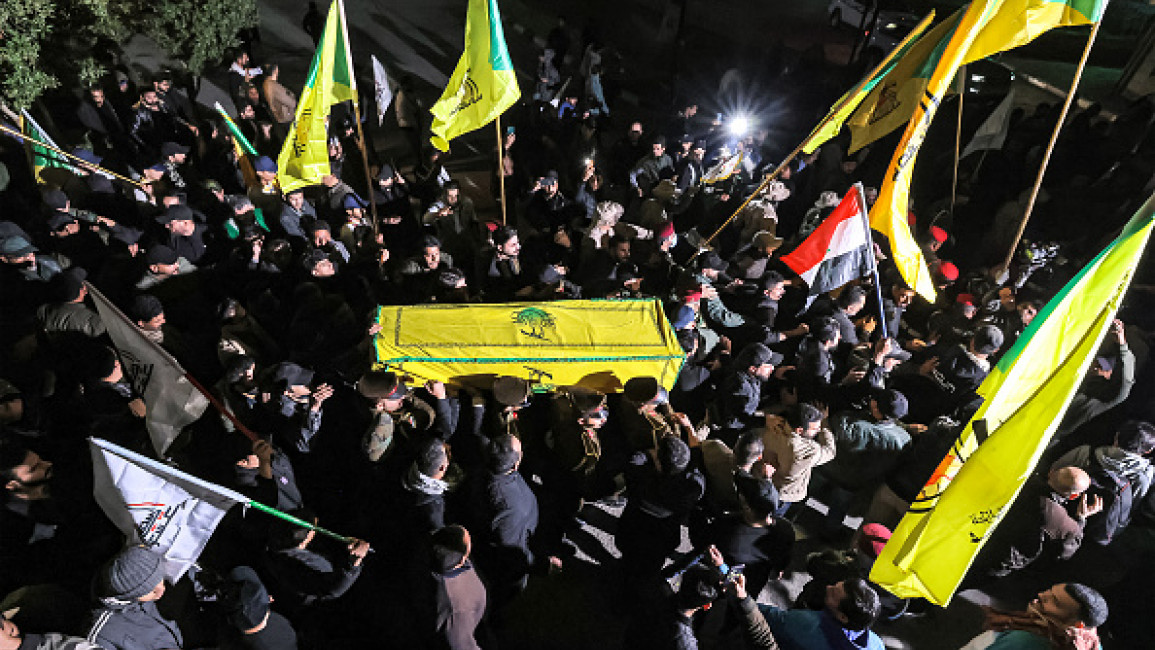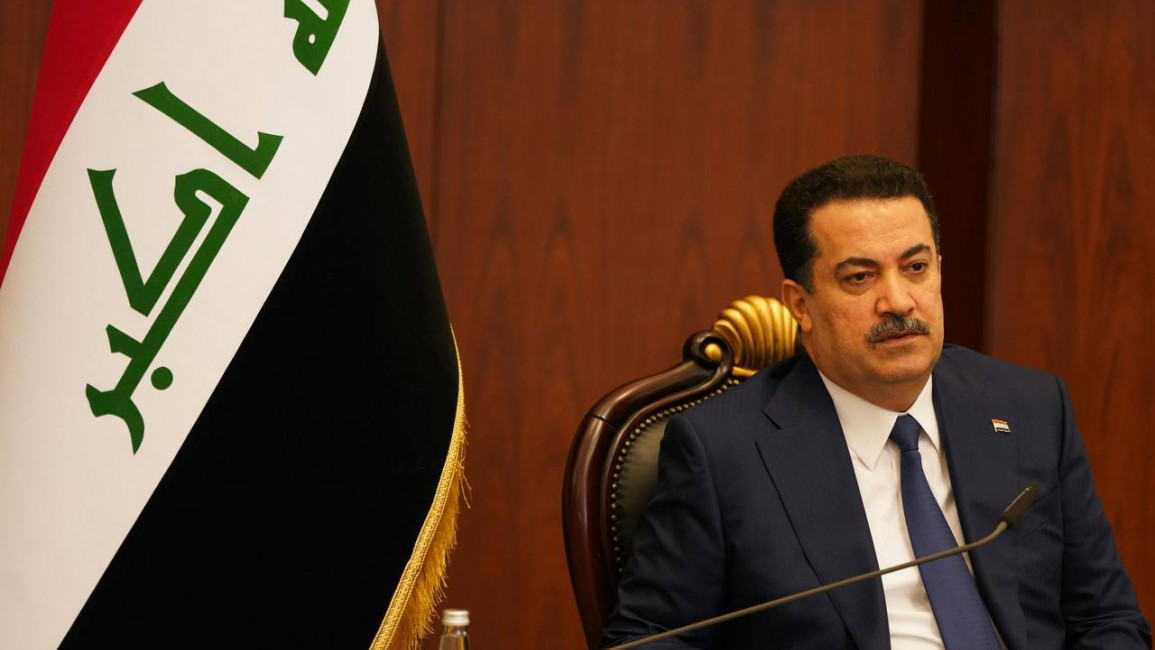
Why US airstrikes in Iraq add to fears of a regional war

On 4 January, the US military carried out an airstrike in central Baghdad which killed Abu Taqwa, a leader of the Harakat al-Nujaba group.
The high-ranking commander of this Iran-backed militia was one of the US military’s targets because he had been involved in previous attacks on US personnel in Iraq, according to US Defence officials.
Designated a terrorist organisation by the US in 2019, Harakat al-Nujaba exists within the Popular Mobilisation Units (PMU), which is an umbrella of dozens of mostly Shia armed groups that formed in 2014 to combat the Islamic State (IS).
For many years, the US military and Iran-backed Shia militias in Iraq have clashed. With Prime Minister Mohammed Shia al-Sudani forming his government in October 2022, these resistance forces paused their attacks on US military targets in Iraq.
"Iraq has a significant anti-US political establishment that is actively trying to eject the US forces. America's positioning with Israel has certainly strengthened their political capital"
But since 7 October, these armed groups have carried out dozens of attacks in various parts of Iraq, including the US embassy in Baghdad. Although Sudani’s office officially condemns this violence, his government has lacked the strength to rein in these Iran-sponsored groups.
Prior to the eruption of the ongoing Israeli war on Gaza, the government in Baghdad was striking a delicate balance between the US, on one side, and Iran and these Shia militias sponsored by Tehran, on the other.
Yet, recent developments in Iraq and the region are making this balance increasingly difficult for Baghdad to maintain as containing and navigating the ripple effects of Israel’s war on Gaza become increasingly challenging for Sudani’s government.
Since Sudani and his political allies came to office, Iraq has undeniably moved closer to Iran. The carnage in Gaza in and of itself is probably not pushing Iraqis toward Iran, but it is pushing them away from the US and other Western powers.
Iraq has technically been at war with Israel since 1948 and the Iraqi population is pro-Palestinian, which helps explain how the Biden administration’s support for Israel’s crimes in Gaza has caused anti-American sentiments in Iraq to spike since October, as they have in virtually all Arab countries.
“I think America’s position in the Gaza war has strained its relations with Iraq the same way that it has with many other Arab partners. But the difference with Baghdad is that Iraq has a significant anti-US political establishment that is actively trying to eject the US forces. America’s positioning with Israel has certainly strengthened their political capital,” said Ryan Bohl, a Middle East and North African analyst at the risk intelligence company RANE, in an interview with The New Arab.
One day after the strike that killed Abu Taqwa, Sudani declared that Iraq’s government was “proceeding to end the presence of the international coalition forces”. Yet, on 8 January, the Pentagon press secretary General Patrick Ryder explained that Washington currently does not have plans for any troop withdrawals from Iraq.
|
|
“Right now, I'm not aware of any plans [for a withdrawal]. We continue to remain very focused on the defeat ISIS mission,” said Ryder, who added that the US has 2,500 troops which are present in Iraq “at the invitation” of Baghdad.
According to a Politico article published one day after Ryder made that statement, Sudani assured officials in the US that he seeks to negotiate an arrangement for keeping US forces in his country and that his statement about ending their presence was “an attempt to satisfy domestic political audiences”.
“I think the airstrike will worsen relations between the US and Iraq in the short term and create political turbulence in their relationship, but I don’t think we’re quite at the stage yet where we will see Baghdad push US forces out,” explained Bohl.
“Iraq remains pretty dependent on the US for most of its most advanced military equipment and it’s not eager to lose access to that by ejecting US forces or substantially degrading diplomatic relations with the US. But this is not a popular position and could eventually result in significant unrest that tries to use violence to force the Baghdad government to change its policies towards the US,” added Bohl.
"With Washington directly targeting leaders of Iraqi militias, Iraq risks destabilisation as well as the deterioration in the fragile balance between Baghdad and Iraqi Shia militias"
Attacking Iraq's sovereignty
The Biden administration’s policies have put Iraq in a very difficult position. “The government in Baghdad wants to sustain its relationship with the US, and a significant portion of the government wants to see US troops remain in Iraq at least for a few more years. But with Washington directly targeting leaders of Iraqi militias, Iraq risks destabilisation as well as the deterioration in the fragile balance between Baghdad and Iraqi Shia militias,” said Dr Trita Parsi, the executive vice president of the Quincy Institute for Responsible Statecraft, in an interview with TNA.
“What I think is problematic here is that [Harakat al-Nujaba] has been struck in Iraq at a time in which the relationship between Baghdad and Washington is already, at least from the Iranian-backed side of the government in Baghdad, seen with quite a lot of scepticism. The US still is very deeply involved in security sector reform in Iraq and the US still sees itself as a partner of the Iraqi government despite the fact that the current Sudani government is pivoting closer to Iran,” Dr Andreas Krieg, Associate Professor at the Defence Studies Department of King's College London, told TNA.
“But it’s problematic because the US, on the one hand, is backing the government in Baghdad - it’s helping and supporting Iraq in development - and at the same time it’s striking a group that is part of the network of the PMUs, [which are] forces that are under the supervision of the ministry of the interior and the prime minister’s office,” added Dr Krieg.
“They are integrated into the security sector of Iraq. In essence, they are an Iraqi group and they are tied to the government. They are not necessarily a non-state actor. They’re not your conventional non-state actor. They are a state actor. They’re obviously an extension of the Iranian state that then ties into the Iraqi state…The problem is that the US has struck an extension of the Iraqi state and that is seen as a major violation of the sovereignty of Iraq.”
|
|
Escalation of regional crises
From Lebanon to the Red Sea, the Gaza war is dangerously expanding. With the Biden administration showing no signs of requiring Israel to agree to a ceasefire, which Washington absolutely has the leverage to do, the Israeli war on Gaza seems set to continue regionalising and internationalising.
Rather than moving ahead with demands for a ceasefire, the White House continues supporting the Israeli war machine amid its industrial slaughter of tens of thousands in Gaza while pushing ahead with its efforts to deter Iran-linked actors from waging violence against US troops in Iraq and Syria.
“It is shocking to me that the US media is not even reporting that the demand of the [Iran-led] Axis is for a ceasefire in Gaza and that if Biden agreed to push for such a ceasefire (which he can do), the attacks on US troops would stop,” Dr Parsi told TNA.
"Should an all-out war break out between Israel and Lebanon's Hezbollah, US troops in Iraq and Syria will be all the more vulnerable to the dangers of the Gaza war's escalation and expansion"
“Attacks on US troops by Iraqi militias completely stopped for the six days that there was a ceasefire in November. And, of course, it is shocking that Biden is not even willing to contemplate a ceasefire to protect US troops but instead believes he will protect US troops by risking war.”
Within the context of Iraq’s current situation, there are valid reasons to be concerned about upcoming attacks against US troops, including deadly ones. Should an all-out war break out between Israel and Lebanon’s Hezbollah, US troops in Iraq and Syria will be all the more vulnerable to the dangers of the Gaza war’s escalation and expansion.
These would be the consequences of political calculations by the Biden administration which have shaped US policies of not giving Prime Minister Benjamin Netanyahu’s government any ultimatums or redlines, and not conditioning aid to Israel.
Giorgio Cafiero is the CEO of Gulf State Analytics.
Follow him on Twitter: @GiorgioCafiero




